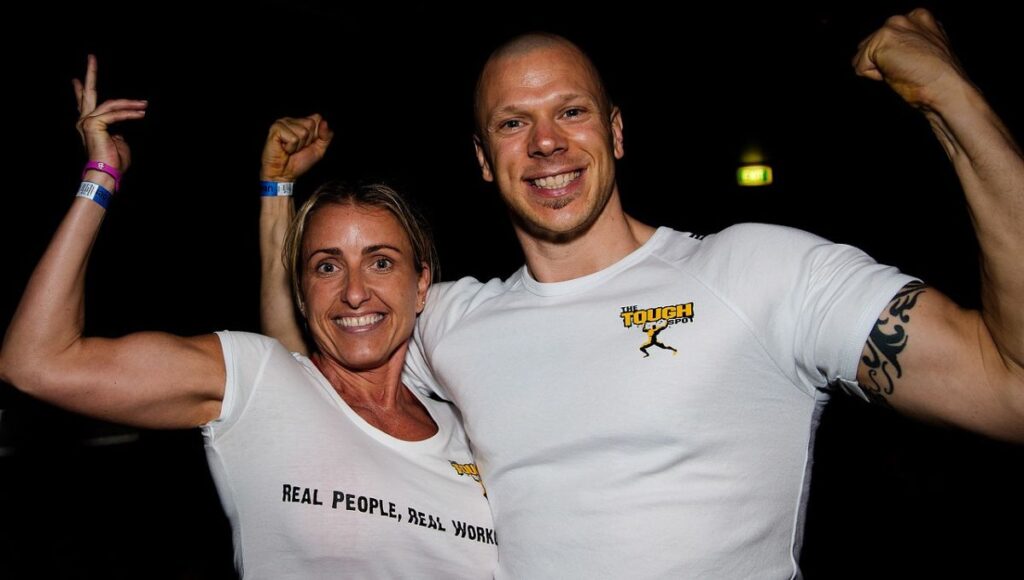Building muscle is a science as much as it is an art. You’ve probably heard about the essentials: lifting heavy weights, eating enough protein, and staying consistent. But what if there’s more going on beneath the surface? Many people don’t realise that hidden factors—things you might not even think about—can have a massive impact on how efficiently you build muscle.
In this article, we’ll uncover three often-overlooked influences on muscle gain: genetics, sleep quality, and gut health. By understanding these elements and learning how to optimise them, you’ll be better equipped to reach your fitness goals.
1. Genetics: The Blueprint for Your Gains

How Genetics Shape Your Muscle Growth
- Your DNA plays a significant role in determining how your body responds to strength training.
- Fast-twitch and slow-twitch muscle fibres: Some people are naturally predisposed to build muscle faster because they have a higher proportion of fast-twitch muscle fibres.
- Myostatin levels: Myostatin is a protein that inhibits muscle growth. Low levels of myostatin can lead to greater muscle development.
Studies on Genetic Influence
- A study in the Journal of Physiology found that genetic variations account for up to 70% of individual differences in muscle mass gains during resistance training (Thomis et al., 1998).
- People with certain ACTN3 gene variants perform better in power-based activities and show greater muscle hypertrophy.
Can You Work Around Genetics?
- While you can’t change your DNA, you can tailor your training to make the most of your natural strengths. For example:
- Focus on hypertrophy-specific training if you’re a slow gainer.
- Incorporate explosive exercises if you’re gifted with fast-twitch dominance.
- Proper nutrition and recovery can amplify your results, even if genetics aren’t on your side.
10 Steps to Get Perfect Six Pack Abs
2. Sleep: The Unsung Hero of Muscle Growth
Why Sleep Matters for Muscle Gain
- Muscle recovery happens during sleep, particularly in deep sleep stages. During this time, your body produces growth hormone, which is essential for repairing and building muscle tissue.
- Lack of sleep disrupts protein synthesis and increases cortisol, a catabolic hormone that breaks down muscle.
The Science Behind Sleep and Gains

- Research published in Sleep journal showed that people who slept less than six hours a night experienced 60% less muscle mass gain compared to those who got at least seven hours (Dattilo et al., 2011).
- Sleep deprivation also reduces your ability to train effectively, leading to subpar workouts.
Tips to Improve Sleep Quality
- Stick to a consistent sleep schedule, even on weekends.
- Create a sleep-friendly environment: Keep your room dark, cool, and quiet.
- Avoid caffeine and blue light exposure at least two hours before bedtime.
- Consider tracking your sleep with apps or wearable devices to identify patterns and areas for improvement.
3. Gut Health: The Surprising Link to Muscle Growth
Gut Microbiome and Protein Absorption
- Your gut microbiome—the trillions of bacteria living in your digestive system—plays a key role in how well you absorb nutrients like protein.
- Poor gut health can hinder digestion, leading to nutrient deficiencies that impact muscle repair and growth.
Inflammation and Recovery
- An imbalanced gut can trigger systemic inflammation, slowing down muscle recovery and reducing your performance in the gym.
- Studies have linked a healthy gut microbiome with improved recovery times and greater exercise efficiency.

Research Supporting Gut-Muscle Connection
- A study in Nature Medicine found that athletes with diverse gut bacteria had better endurance and strength compared to those with less diversity (Clarke et al., 2014).
- Specific strains like Lactobacillus plantarum and Bifidobacterium longum are linked to improved muscle recovery and reduced inflammation.
How to Build the Perfect V-Tape Shape
Optimising Gut Health for Muscle Growth
- Include probiotic-rich foods like yoghurt, kefir, and kimchi in your diet.
- Eat fibre-rich foods, such as vegetables, fruits, and whole grains, to support gut bacteria.
- Stay hydrated, as water aids digestion and nutrient absorption.
- Consider a high-quality probiotic supplement if your diet lacks variety.
Conclusion
Muscle gain isn’t just about lifting weights and eating chicken breasts. Your genetic blueprint, sleep quality, and gut health all play crucial roles in determining your results. By understanding these hidden factors and making simple adjustments to your routine, you can unlock new levels of progress in your fitness journey.
Whether it’s tailoring your workouts to match your genetic strengths, prioritising restful sleep, or nurturing a healthy gut, the little things add up. So, next time you hit the gym, remember: muscle-building isn’t just about what you do—it’s also about understanding what’s going on behind the scenes.
4 Best Tips for Beginners to Build Muscle
Bibliography
- Clarke, S. F., Murphy, E. F., O’Sullivan, O., et al. (2014). Exercise and associated dietary extremes impact on gut microbial diversity. Nature Medicine, 20(8), 861–863.
- Dattilo, M., Antunes, H. K., Medeiros, A., et al. (2011). Sleep and muscle recovery: Endocrinological and molecular basis for a new and promising hypothesis. Sleep Medicine Reviews, 15(4), 269–279.
- Thomis, M. A., Beunen, G. P., Maes, H. H., et al. (1998). Strength training: Importance of genetic factors. Journal of Physiology, 512(2), 515–521.
Key Takeaways Table
This content is originated from https://www.boxrox.com your Online Magazine for Competitive Fitness.